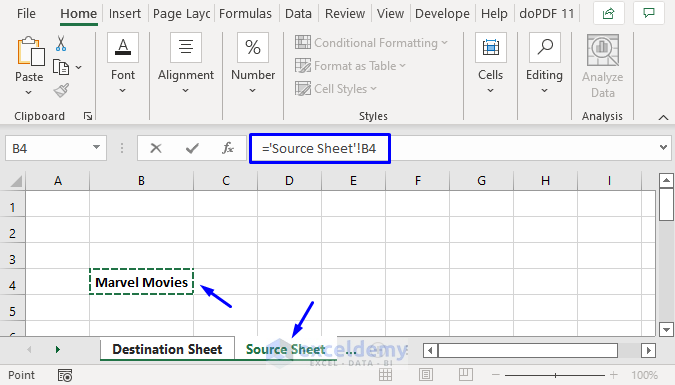How to Check Links in Excel Sheets Easily

Have you ever found yourself sifting through an Excel worksheet, manually checking links to ensure they are all valid? This tedious task can be particularly time-consuming and prone to errors, especially in large datasets or when managing multiple sheets. However, with the right tools and techniques, you can simplify this process, ensuring both efficiency and accuracy. In this guide, we'll explore several methods to check links in Excel, from manual techniques to automated solutions, providing you with a comprehensive toolkit to manage your spreadsheets effortlessly.
Understanding URL Validation in Excel

Before diving into how to validate links, it's essential to understand what URL validation entails:
- Validating the Format: Ensuring the URL adheres to the correct syntax for URLs.
- Checking Link Status: Verifying if the links are still active and direct to existing pages or resources.
- Hyperlink Functionality: Confirming that clicking the link in Excel leads to the intended destination.
Manual Methods for Checking Links in Excel

While manual methods are straightforward, they require time and attention:
1. Hyperlink Function

The simplest way to check a single link:
- Select the cell with the hyperlink.
- Right-click and choose "Edit Hyperlink" or press "Ctrl+K" to open the "Edit Hyperlink" dialog.
- Look at the address bar to see if the URL is correctly formatted and active.
- Click "Test Link" if you want to see where the hyperlink leads.
2. Manual URL Formatting Check

For bulk checking:
- Use Excel formulas like =ISNUMBER(FIND("http://",A1)) or =ISNUMBER(FIND("https://",A1)) to check for URL schemes.
⚠️ Note: This method will only confirm if the URL is formatted correctly, not its validity.
Automated Tools for Link Checking in Excel

For a more efficient approach:
1. Excel Add-ins

Several add-ins are available:
- LinkChecker: An Excel add-in for bulk URL validation.
- URL-Tools: Provides URL diagnostics and checks.
These tools often allow you to:
- Check the validity of links in real-time.
- Identify broken or redirected links.
- Generate detailed reports on link status.
2. Online Link Checkers

Web-based tools like:
- Google Sheets with an "IMPORTXML" function for checking web status.
- Online services like Broken Link Checker or Dead Link Checker.
These can be integrated with Excel through:
- Web queries to fetch status codes.
- Power Query to automate data retrieval and analysis.
| Tool | Description |
|---|---|
| LinkChecker | Excel add-in for batch URL validation |
| URL-Tools | Provides URL diagnostics and bulk checks |
| Broken Link Checker | Web-based tool to validate URLs |

Advanced Techniques for Bulk URL Validation

1. Power Query and Web API

Here’s how to integrate Excel with external APIs:
- Use Power Query to fetch URL data from web APIs like httpstatus.io or urlhaus.com.
- Create custom functions in Power Query to automate URL checks and update statuses in your Excel worksheet.
2. VBA Macros for Automation

For advanced users:
- Write VBA scripts to:
- Automatically check URL status via HTTP requests.
- Update your spreadsheet with the status results.
- Here’s a simple example of VBA code for URL validation:
Sub CheckURLs() Dim ws As Worksheet Dim lastRow As Long Dim i As LongSet ws = ThisWorkbook.Sheets("Sheet1") lastRow = ws.Cells(ws.Rows.Count, "A").End(xlUp).Row For i = 2 To lastRow ' Assuming URLs start in cell A2 On Error Resume Next With CreateObject("MSXML2.XMLHTTP") .Open "GET", ws.Range("A" & i).Value, False .send ws.Range("B" & i).Value = .status End With On Error GoTo 0 Next iEnd Sub
🔧 Note: VBA requires a decent level of programming knowledge. Mistakes can lead to errors or security issues.
Best Practices for Maintaining Link Integrity

To keep your links accurate:
- Regular Checks: Schedule link checks at least monthly for critical spreadsheets.
- Use Redirects: Implement URL shorteners or permanent redirects to manage changes in URLs.
- Document Changes: Keep a log or use version control for link changes in your documents.
- Update Timely: Keep links updated promptly, especially after website redesigns or domain changes.
As you've seen, checking links in Excel can be approached through various methods, each with its level of efficiency and accuracy. From manual checks for smaller datasets to leveraging the power of automation for extensive spreadsheets, there's a solution for every scenario. Remember to integrate these techniques into your workflow to maintain the integrity of your data, ensure your documents remain up-to-date, and enhance user experience by providing valid links. Your spreadsheet management will not only become more efficient but also more reliable, reducing the likelihood of errors or outdated information.
Why should I bother checking links in my Excel sheets?

+
Checking links ensures that the information you provide is up-to-date and accessible. Broken links can lead to user frustration and reflect poorly on the quality of your work.
Can I automate the link checking process in Excel?

+
Yes, you can automate link checking using VBA scripts, Power Query with external APIs, or by using specialized Excel add-ins designed for link validation.
How often should I check links in my spreadsheet?

+
For critical documents, consider checking links at least monthly, or more frequently if there are frequent updates to the linked resources or if the links are part of a public-facing document.



